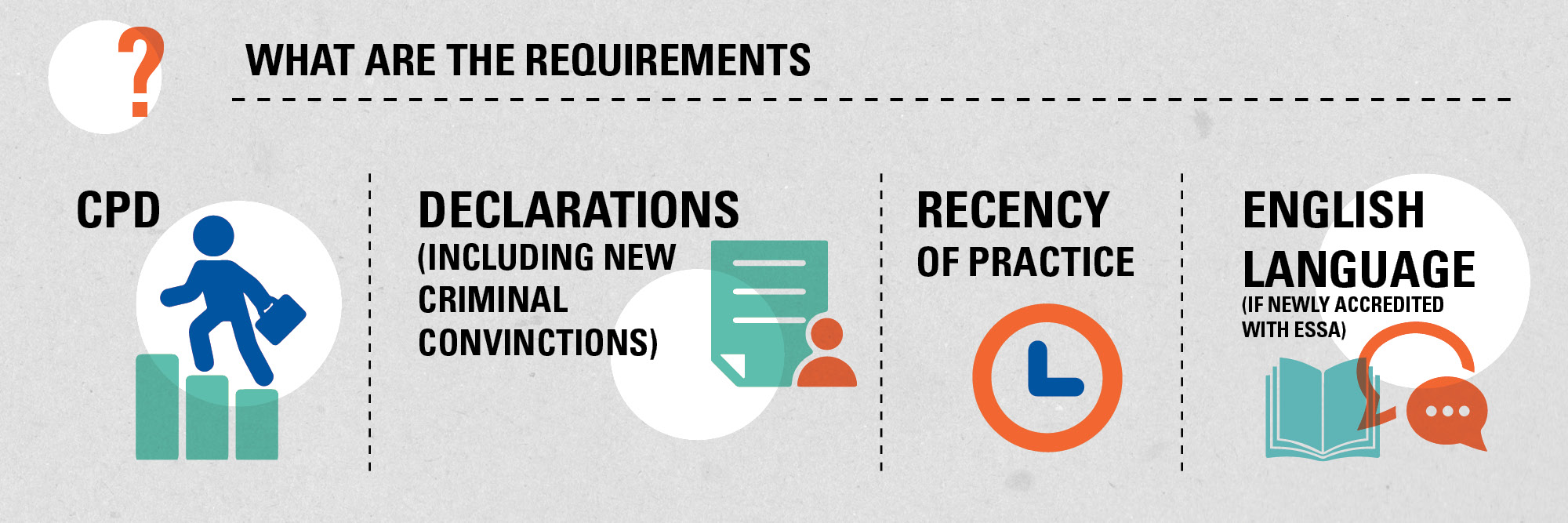ESSA Membership & Accreditation Standards
To be eligible to gain and maintain membership and/or accreditation with ESSA individuals may be asked to provide evidence of meeting professional standards:
- when applying for accreditation or membership
- at annual renewal of accreditation or membership
- reinstating accreditation after a period of absence
- at other times at ESSA’s discretion
It is important to be familiar with the requirements as this ensures you meet the quality standards of the industry.
From the 1 January 2018 there are some updates to ESSA’s membership and accreditation requirements.
Why does ESSA have these requirements?

Growing our professions involves raising the bar in the industry. ESSA is taking steps to ensure that all our professionals are aligned with other self-regulating professions (e.g. Dietetics and Speech Pathology) through ESSA’s membership with the
National Alliance of Self-Regulating Health Professions (NASRHP) membership.
A full list of the requirements can be found
here.
National Alliance of Self-Regulating Professions (NASRHP)
Why are AEPs not registered with AHPRA?
AHPRA regulates the National Registration and Accreditation Scheme (NRAS) and the requirements of the Health Practitioner Regulation National Law. Individuals must register with AHPRA in order to practice in regulated health professions (as outlined in the National Law).
AEP is a self-regulated health profession, and therefore the requirements of the Health Practitioner Regulation National Law do not apply. ESSA is the self-regulating body for AEPs, and performs a similar function to AHPRA by accrediting professionals.
Advocacy efforts indicates it would be cost prohibitive to the government and the exercise physiology profession to be regulated, potentially resulting in a negative impact on the profession.
Additionally, government considers that the profession as a whole is not considered risky enough to the public to require inclusion in the NRAS, and that ESSA provides sufficient self-regulation for the its professions (particularly through its commitment to NASRHP). An industry goal is to ensure professions are not overregulated, and regulating a non-risky profession does not fit their mandate.
ESSA is committed to the quality of the accredited professions, and is a full member of the NASRHP (see below). One of the benefits of self-regulating is that all of ESSA’s activities, whether in the accreditation or membership space, are designed to support quality accredited professionals and driving the professions forward as a whole. This also allows ESSA to be more responsive to industry need.
What is the National Alliance of Self-Regulating Health Professions?
The
National Alliance of Self-Regulating Health Professions (NASRHP) is an independent body providing a quality framework for self-regulating health professions. It originally began in 2008 as an informal alliance under the auspice of Allied Health Professions Australia but has now become an independent body.
NASRHP has a set of standards for membership that have been closely modelled on the standards that health professions regulated by Australian Health Practitioner Regulation Agency (AHPRA) have to meet.
NASRHP membership is open to professional bodies, not individuals.
ESSA is a founding member of the NASHRP alongside other peak professional associations including:
- Audiology Australia
- Australasian Sonographers Association
- Australian and New Zealand College of Perfusionists
- Australian Association of Social Workers
- Australian Orthotic Prosthetic Association
- Dietitians Association of Australia
- Speech Pathology Australia
Why did ESSA apply for NASRHP membership?
The benefits of recognition with the NASRHP include:
- Strengthens ESSA and ESSA professionals’ commitment to consumers to practice safely, effectively and to a high standard
- Strengthen ESSA and our accredited professionals’ position and recognition within the Australian health care system
- Strengthens the advocacy platform for all self-regulating allied health professions
- Leads to a stronger advocacy platform for AHPA which promotes all allied health professions (i.e. regulated and self-regulated)
- Extending the NASRHP standards across all ESSA professions promotes recognition of the quality and excellence of all ESSA professionals
To gain formal recognition with the NASRHP the exercise physiology profession must meet all the NASRHP standards. The requirements will also be extended to all ESSA professions, including Accredited Exercise Scientists, Accredited Sports Scientists and Accredited High Performance Managers to promote quality and consistency.
What does NASRHP membership mean for ESSA professionals?
Ultimately, meeting the NASRHP standards optimises the profile and recognition of our accredited professionals, creating increased workforce opportunities within the Australian health care system and exercise and sports science industry.
ESSA already met the majority of the NASRHP standards. In order to meet the remainder, ESSA needed to revise some requirements, and introduce some new ones.
These changes came into effect on 1 January 2018.
It is important that all ESSA professionals are familiar with these requirements to ensure compliance.
There are changes to the information you need to provide if selected as part of ESSA’s annual audit. Providing evidence of CPD will not be enough, evidence for other declarations made for accreditation including recency of practice will also be required. These changes will be implemented in a way that is fair but will change what information you need to retain about your practice and for how long.
ESSA is here to help professionals understand and ensure practice is best positioned with implementation of the NASHRP standards. We will be working with our professionals to ensure they meet the requirements.
You can also ask questions about NASRHP by contacting ESSA via
[email protected] or by calling the National Office on 07 3171 3335.
Updated January 2020